Charles Sturt University: Cambridge Analytica Ethical Analysis
VerifiedAdded on 2023/04/22
|8
|1997
|318
Essay
AI Summary
This essay examines the ethical implications of the Cambridge Analytica scandal through the lens of four classical ethical theories: utilitarianism, deontology, virtue ethics, and contract theory. It begins by introducing the role of social media and the inherent risks to user privacy, using the Cambridge Analytica case as a prime example of cyber-crime. The analysis delves into how Facebook's data leak to Cambridge Analytica violated user trust and ethical standards. Each ethical theory is applied to the case, revealing how the actions of Facebook and Cambridge Analytica failed to uphold utilitarian principles by not maximizing happiness for the majority, violated deontological duties by acting unethically, undermined virtue ethics by prioritizing profit over user well-being, and breached the contract theory by failing to protect user data as agreed. The essay concludes that all parties involved failed in their ethical responsibilities and recommends stricter regulations, corporate accountability, and user awareness to prevent similar breaches in the future. Desklib offers access to similar essays and solved assignments for students.

SOCIAL MEDIA
Paraphrase This Document
Need a fresh take? Get an instant paraphrase of this document with our AI Paraphraser
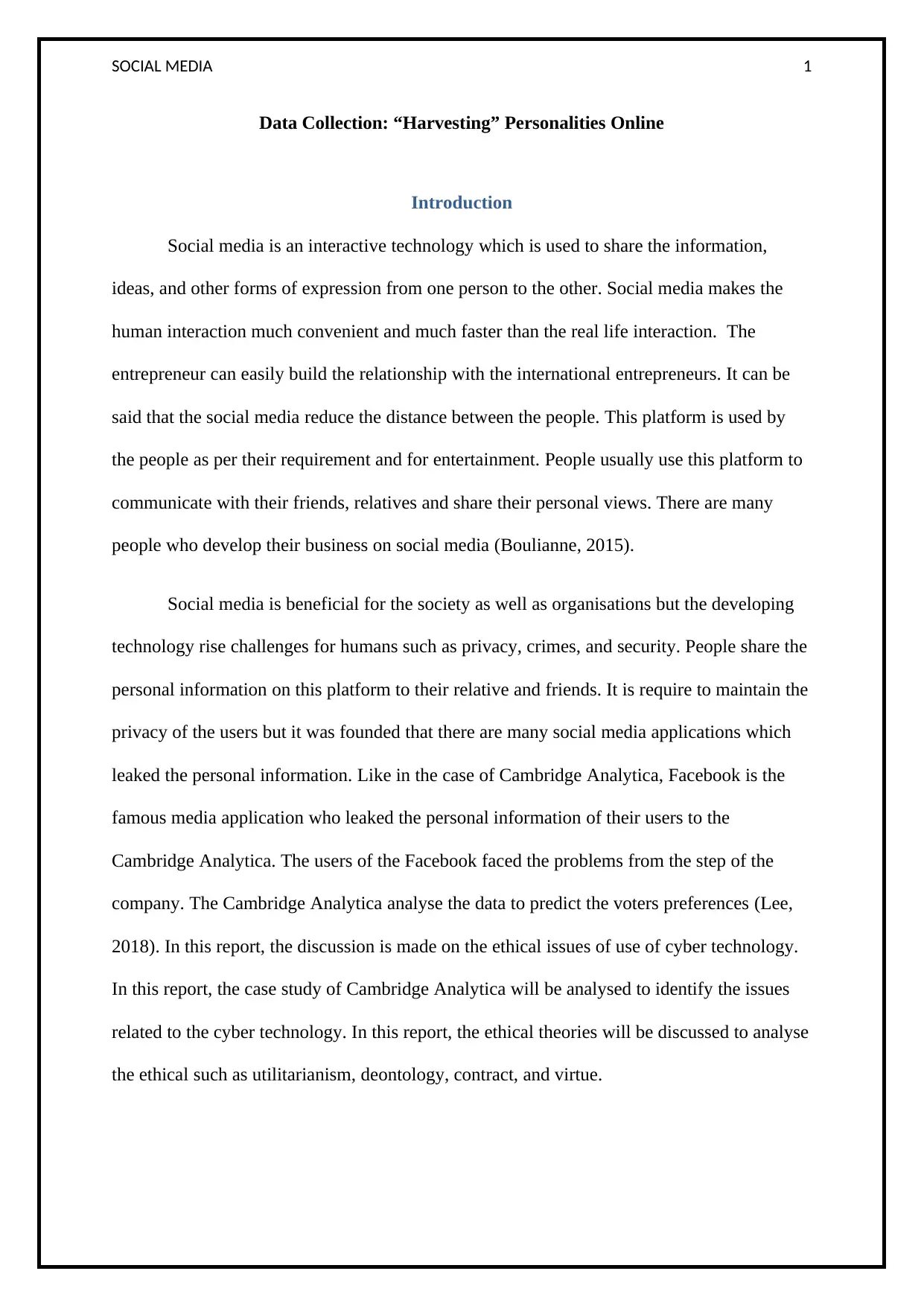
SOCIAL MEDIA 1
Data Collection: “Harvesting” Personalities Online
Introduction
Social media is an interactive technology which is used to share the information,
ideas, and other forms of expression from one person to the other. Social media makes the
human interaction much convenient and much faster than the real life interaction. The
entrepreneur can easily build the relationship with the international entrepreneurs. It can be
said that the social media reduce the distance between the people. This platform is used by
the people as per their requirement and for entertainment. People usually use this platform to
communicate with their friends, relatives and share their personal views. There are many
people who develop their business on social media (Boulianne, 2015).
Social media is beneficial for the society as well as organisations but the developing
technology rise challenges for humans such as privacy, crimes, and security. People share the
personal information on this platform to their relative and friends. It is require to maintain the
privacy of the users but it was founded that there are many social media applications which
leaked the personal information. Like in the case of Cambridge Analytica, Facebook is the
famous media application who leaked the personal information of their users to the
Cambridge Analytica. The users of the Facebook faced the problems from the step of the
company. The Cambridge Analytica analyse the data to predict the voters preferences (Lee,
2018). In this report, the discussion is made on the ethical issues of use of cyber technology.
In this report, the case study of Cambridge Analytica will be analysed to identify the issues
related to the cyber technology. In this report, the ethical theories will be discussed to analyse
the ethical such as utilitarianism, deontology, contract, and virtue.
Data Collection: “Harvesting” Personalities Online
Introduction
Social media is an interactive technology which is used to share the information,
ideas, and other forms of expression from one person to the other. Social media makes the
human interaction much convenient and much faster than the real life interaction. The
entrepreneur can easily build the relationship with the international entrepreneurs. It can be
said that the social media reduce the distance between the people. This platform is used by
the people as per their requirement and for entertainment. People usually use this platform to
communicate with their friends, relatives and share their personal views. There are many
people who develop their business on social media (Boulianne, 2015).
Social media is beneficial for the society as well as organisations but the developing
technology rise challenges for humans such as privacy, crimes, and security. People share the
personal information on this platform to their relative and friends. It is require to maintain the
privacy of the users but it was founded that there are many social media applications which
leaked the personal information. Like in the case of Cambridge Analytica, Facebook is the
famous media application who leaked the personal information of their users to the
Cambridge Analytica. The users of the Facebook faced the problems from the step of the
company. The Cambridge Analytica analyse the data to predict the voters preferences (Lee,
2018). In this report, the discussion is made on the ethical issues of use of cyber technology.
In this report, the case study of Cambridge Analytica will be analysed to identify the issues
related to the cyber technology. In this report, the ethical theories will be discussed to analyse
the ethical such as utilitarianism, deontology, contract, and virtue.
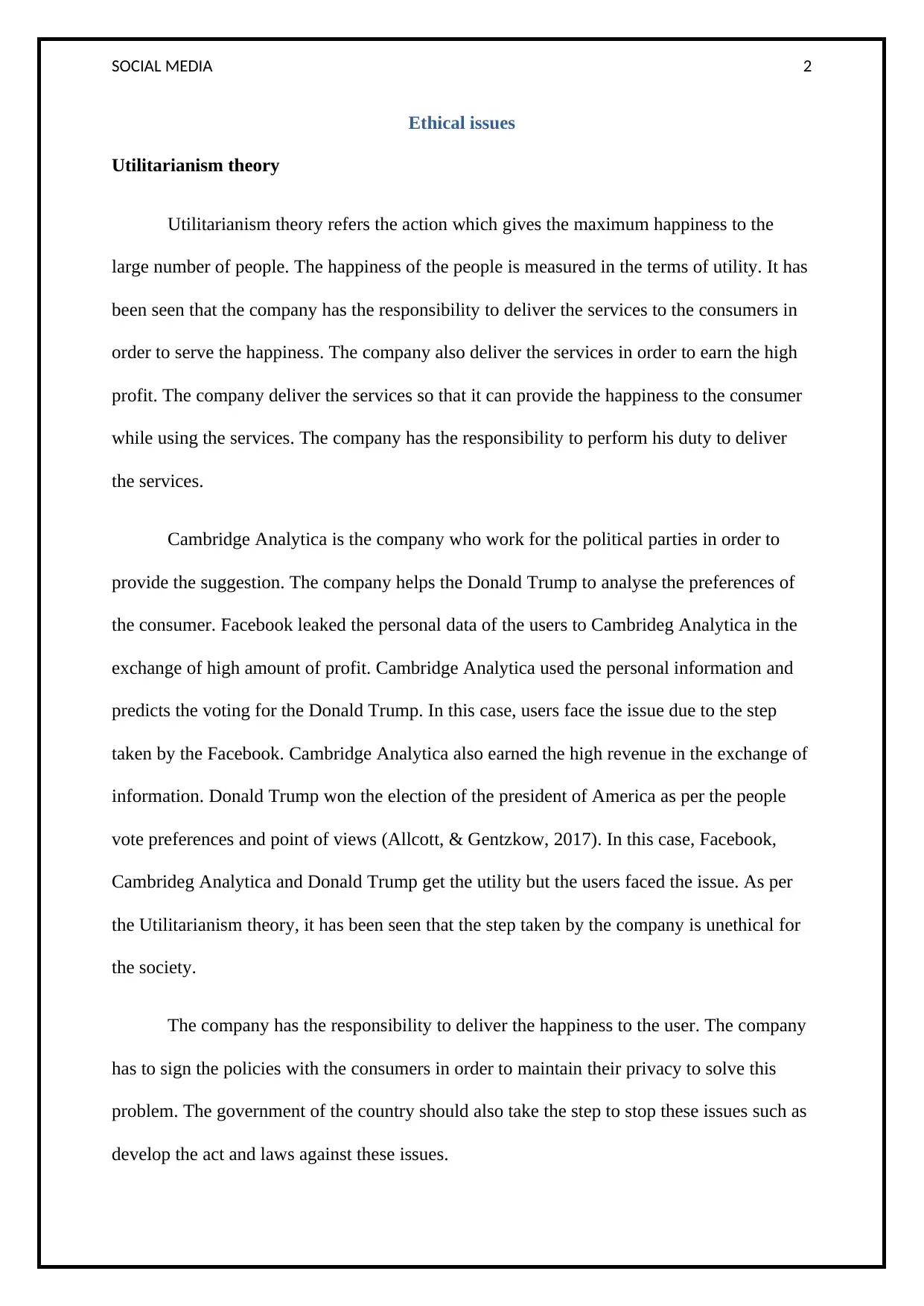
SOCIAL MEDIA 2
Ethical issues
Utilitarianism theory
Utilitarianism theory refers the action which gives the maximum happiness to the
large number of people. The happiness of the people is measured in the terms of utility. It has
been seen that the company has the responsibility to deliver the services to the consumers in
order to serve the happiness. The company also deliver the services in order to earn the high
profit. The company deliver the services so that it can provide the happiness to the consumer
while using the services. The company has the responsibility to perform his duty to deliver
the services.
Cambridge Analytica is the company who work for the political parties in order to
provide the suggestion. The company helps the Donald Trump to analyse the preferences of
the consumer. Facebook leaked the personal data of the users to Cambrideg Analytica in the
exchange of high amount of profit. Cambridge Analytica used the personal information and
predicts the voting for the Donald Trump. In this case, users face the issue due to the step
taken by the Facebook. Cambridge Analytica also earned the high revenue in the exchange of
information. Donald Trump won the election of the president of America as per the people
vote preferences and point of views (Allcott, & Gentzkow, 2017). In this case, Facebook,
Cambrideg Analytica and Donald Trump get the utility but the users faced the issue. As per
the Utilitarianism theory, it has been seen that the step taken by the company is unethical for
the society.
The company has the responsibility to deliver the happiness to the user. The company
has to sign the policies with the consumers in order to maintain their privacy to solve this
problem. The government of the country should also take the step to stop these issues such as
develop the act and laws against these issues.
Ethical issues
Utilitarianism theory
Utilitarianism theory refers the action which gives the maximum happiness to the
large number of people. The happiness of the people is measured in the terms of utility. It has
been seen that the company has the responsibility to deliver the services to the consumers in
order to serve the happiness. The company also deliver the services in order to earn the high
profit. The company deliver the services so that it can provide the happiness to the consumer
while using the services. The company has the responsibility to perform his duty to deliver
the services.
Cambridge Analytica is the company who work for the political parties in order to
provide the suggestion. The company helps the Donald Trump to analyse the preferences of
the consumer. Facebook leaked the personal data of the users to Cambrideg Analytica in the
exchange of high amount of profit. Cambridge Analytica used the personal information and
predicts the voting for the Donald Trump. In this case, users face the issue due to the step
taken by the Facebook. Cambridge Analytica also earned the high revenue in the exchange of
information. Donald Trump won the election of the president of America as per the people
vote preferences and point of views (Allcott, & Gentzkow, 2017). In this case, Facebook,
Cambrideg Analytica and Donald Trump get the utility but the users faced the issue. As per
the Utilitarianism theory, it has been seen that the step taken by the company is unethical for
the society.
The company has the responsibility to deliver the happiness to the user. The company
has to sign the policies with the consumers in order to maintain their privacy to solve this
problem. The government of the country should also take the step to stop these issues such as
develop the act and laws against these issues.
⊘ This is a preview!⊘
Do you want full access?
Subscribe today to unlock all pages.

Trusted by 1+ million students worldwide
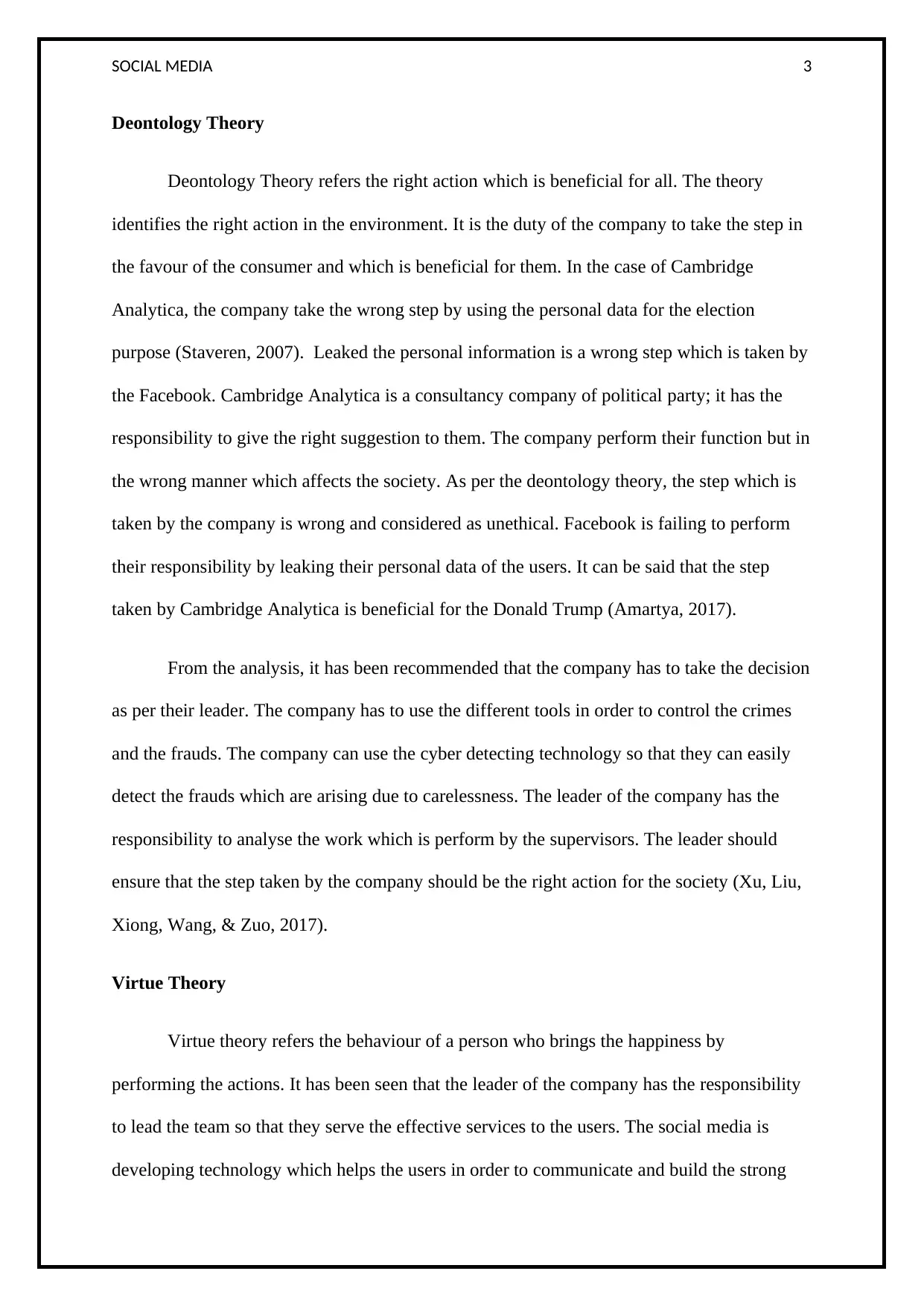
SOCIAL MEDIA 3
Deontology Theory
Deontology Theory refers the right action which is beneficial for all. The theory
identifies the right action in the environment. It is the duty of the company to take the step in
the favour of the consumer and which is beneficial for them. In the case of Cambridge
Analytica, the company take the wrong step by using the personal data for the election
purpose (Staveren, 2007). Leaked the personal information is a wrong step which is taken by
the Facebook. Cambridge Analytica is a consultancy company of political party; it has the
responsibility to give the right suggestion to them. The company perform their function but in
the wrong manner which affects the society. As per the deontology theory, the step which is
taken by the company is wrong and considered as unethical. Facebook is failing to perform
their responsibility by leaking their personal data of the users. It can be said that the step
taken by Cambridge Analytica is beneficial for the Donald Trump (Amartya, 2017).
From the analysis, it has been recommended that the company has to take the decision
as per their leader. The company has to use the different tools in order to control the crimes
and the frauds. The company can use the cyber detecting technology so that they can easily
detect the frauds which are arising due to carelessness. The leader of the company has the
responsibility to analyse the work which is perform by the supervisors. The leader should
ensure that the step taken by the company should be the right action for the society (Xu, Liu,
Xiong, Wang, & Zuo, 2017).
Virtue Theory
Virtue theory refers the behaviour of a person who brings the happiness by
performing the actions. It has been seen that the leader of the company has the responsibility
to lead the team so that they serve the effective services to the users. The social media is
developing technology which helps the users in order to communicate and build the strong
Deontology Theory
Deontology Theory refers the right action which is beneficial for all. The theory
identifies the right action in the environment. It is the duty of the company to take the step in
the favour of the consumer and which is beneficial for them. In the case of Cambridge
Analytica, the company take the wrong step by using the personal data for the election
purpose (Staveren, 2007). Leaked the personal information is a wrong step which is taken by
the Facebook. Cambridge Analytica is a consultancy company of political party; it has the
responsibility to give the right suggestion to them. The company perform their function but in
the wrong manner which affects the society. As per the deontology theory, the step which is
taken by the company is wrong and considered as unethical. Facebook is failing to perform
their responsibility by leaking their personal data of the users. It can be said that the step
taken by Cambridge Analytica is beneficial for the Donald Trump (Amartya, 2017).
From the analysis, it has been recommended that the company has to take the decision
as per their leader. The company has to use the different tools in order to control the crimes
and the frauds. The company can use the cyber detecting technology so that they can easily
detect the frauds which are arising due to carelessness. The leader of the company has the
responsibility to analyse the work which is perform by the supervisors. The leader should
ensure that the step taken by the company should be the right action for the society (Xu, Liu,
Xiong, Wang, & Zuo, 2017).
Virtue Theory
Virtue theory refers the behaviour of a person who brings the happiness by
performing the actions. It has been seen that the leader of the company has the responsibility
to lead the team so that they serve the effective services to the users. The social media is
developing technology which helps the users in order to communicate and build the strong
Paraphrase This Document
Need a fresh take? Get an instant paraphrase of this document with our AI Paraphraser
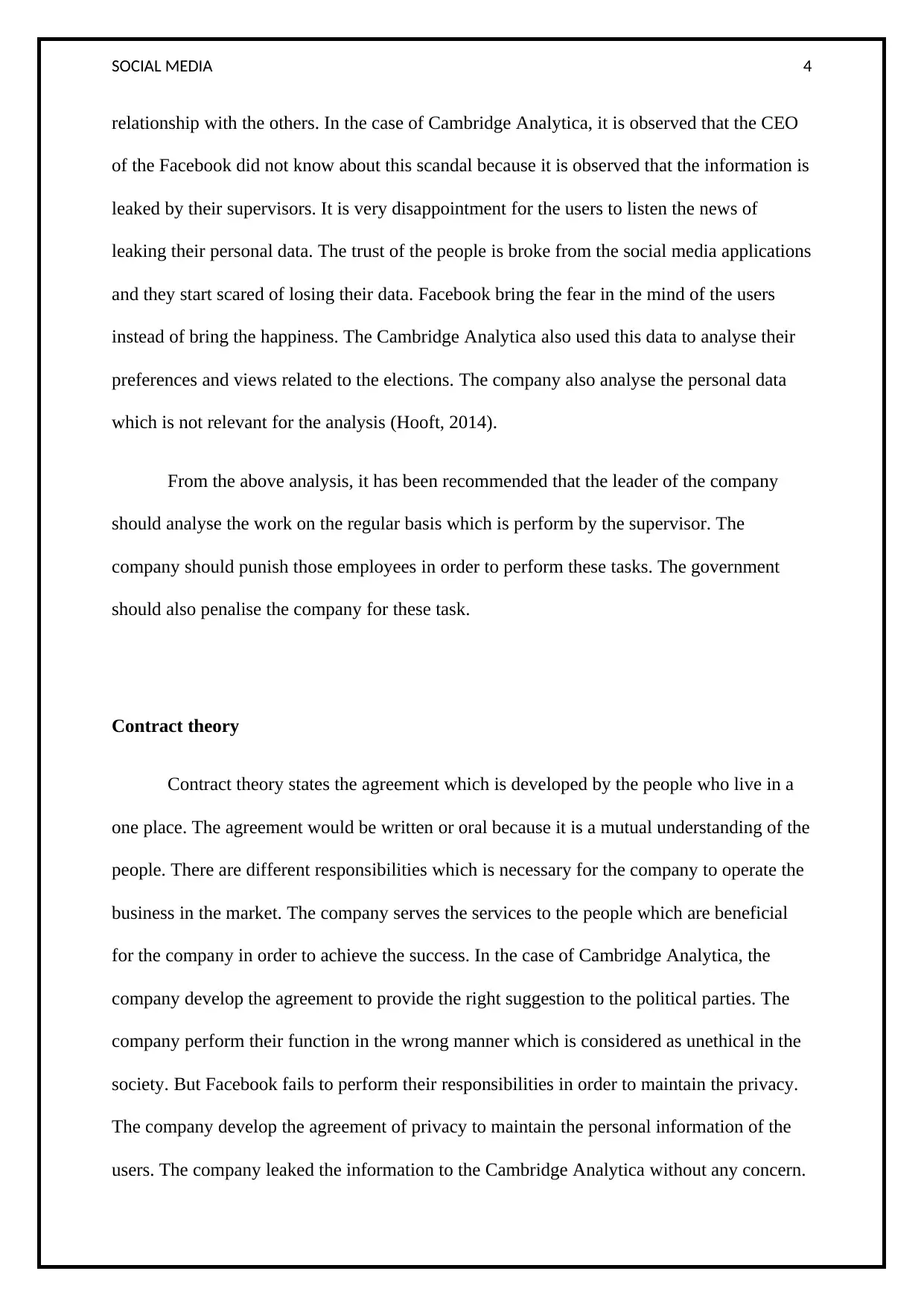
SOCIAL MEDIA 4
relationship with the others. In the case of Cambridge Analytica, it is observed that the CEO
of the Facebook did not know about this scandal because it is observed that the information is
leaked by their supervisors. It is very disappointment for the users to listen the news of
leaking their personal data. The trust of the people is broke from the social media applications
and they start scared of losing their data. Facebook bring the fear in the mind of the users
instead of bring the happiness. The Cambridge Analytica also used this data to analyse their
preferences and views related to the elections. The company also analyse the personal data
which is not relevant for the analysis (Hooft, 2014).
From the above analysis, it has been recommended that the leader of the company
should analyse the work on the regular basis which is perform by the supervisor. The
company should punish those employees in order to perform these tasks. The government
should also penalise the company for these task.
Contract theory
Contract theory states the agreement which is developed by the people who live in a
one place. The agreement would be written or oral because it is a mutual understanding of the
people. There are different responsibilities which is necessary for the company to operate the
business in the market. The company serves the services to the people which are beneficial
for the company in order to achieve the success. In the case of Cambridge Analytica, the
company develop the agreement to provide the right suggestion to the political parties. The
company perform their function in the wrong manner which is considered as unethical in the
society. But Facebook fails to perform their responsibilities in order to maintain the privacy.
The company develop the agreement of privacy to maintain the personal information of the
users. The company leaked the information to the Cambridge Analytica without any concern.
relationship with the others. In the case of Cambridge Analytica, it is observed that the CEO
of the Facebook did not know about this scandal because it is observed that the information is
leaked by their supervisors. It is very disappointment for the users to listen the news of
leaking their personal data. The trust of the people is broke from the social media applications
and they start scared of losing their data. Facebook bring the fear in the mind of the users
instead of bring the happiness. The Cambridge Analytica also used this data to analyse their
preferences and views related to the elections. The company also analyse the personal data
which is not relevant for the analysis (Hooft, 2014).
From the above analysis, it has been recommended that the leader of the company
should analyse the work on the regular basis which is perform by the supervisor. The
company should punish those employees in order to perform these tasks. The government
should also penalise the company for these task.
Contract theory
Contract theory states the agreement which is developed by the people who live in a
one place. The agreement would be written or oral because it is a mutual understanding of the
people. There are different responsibilities which is necessary for the company to operate the
business in the market. The company serves the services to the people which are beneficial
for the company in order to achieve the success. In the case of Cambridge Analytica, the
company develop the agreement to provide the right suggestion to the political parties. The
company perform their function in the wrong manner which is considered as unethical in the
society. But Facebook fails to perform their responsibilities in order to maintain the privacy.
The company develop the agreement of privacy to maintain the personal information of the
users. The company leaked the information to the Cambridge Analytica without any concern.
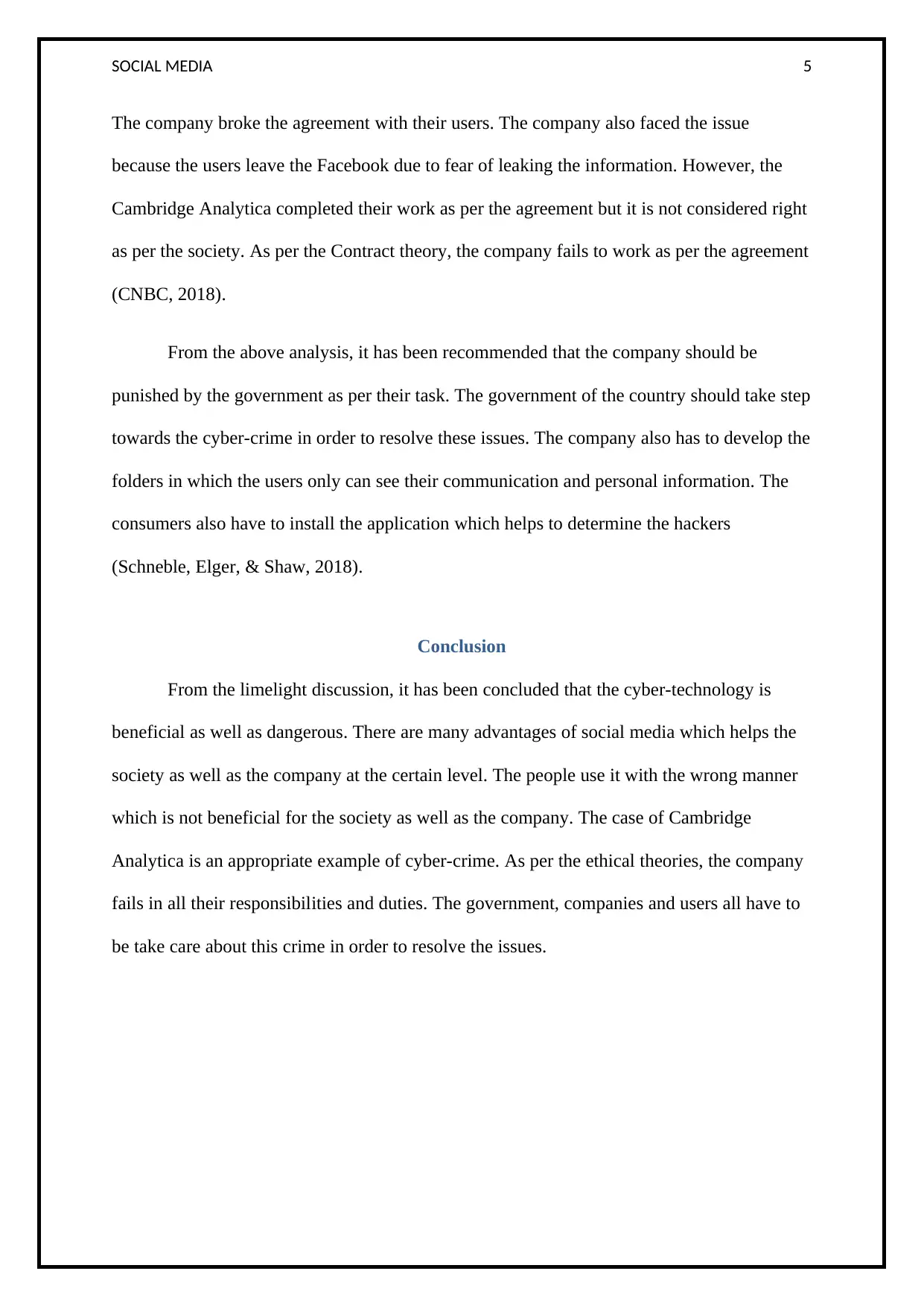
SOCIAL MEDIA 5
The company broke the agreement with their users. The company also faced the issue
because the users leave the Facebook due to fear of leaking the information. However, the
Cambridge Analytica completed their work as per the agreement but it is not considered right
as per the society. As per the Contract theory, the company fails to work as per the agreement
(CNBC, 2018).
From the above analysis, it has been recommended that the company should be
punished by the government as per their task. The government of the country should take step
towards the cyber-crime in order to resolve these issues. The company also has to develop the
folders in which the users only can see their communication and personal information. The
consumers also have to install the application which helps to determine the hackers
(Schneble, Elger, & Shaw, 2018).
Conclusion
From the limelight discussion, it has been concluded that the cyber-technology is
beneficial as well as dangerous. There are many advantages of social media which helps the
society as well as the company at the certain level. The people use it with the wrong manner
which is not beneficial for the society as well as the company. The case of Cambridge
Analytica is an appropriate example of cyber-crime. As per the ethical theories, the company
fails in all their responsibilities and duties. The government, companies and users all have to
be take care about this crime in order to resolve the issues.
The company broke the agreement with their users. The company also faced the issue
because the users leave the Facebook due to fear of leaking the information. However, the
Cambridge Analytica completed their work as per the agreement but it is not considered right
as per the society. As per the Contract theory, the company fails to work as per the agreement
(CNBC, 2018).
From the above analysis, it has been recommended that the company should be
punished by the government as per their task. The government of the country should take step
towards the cyber-crime in order to resolve these issues. The company also has to develop the
folders in which the users only can see their communication and personal information. The
consumers also have to install the application which helps to determine the hackers
(Schneble, Elger, & Shaw, 2018).
Conclusion
From the limelight discussion, it has been concluded that the cyber-technology is
beneficial as well as dangerous. There are many advantages of social media which helps the
society as well as the company at the certain level. The people use it with the wrong manner
which is not beneficial for the society as well as the company. The case of Cambridge
Analytica is an appropriate example of cyber-crime. As per the ethical theories, the company
fails in all their responsibilities and duties. The government, companies and users all have to
be take care about this crime in order to resolve the issues.
⊘ This is a preview!⊘
Do you want full access?
Subscribe today to unlock all pages.

Trusted by 1+ million students worldwide
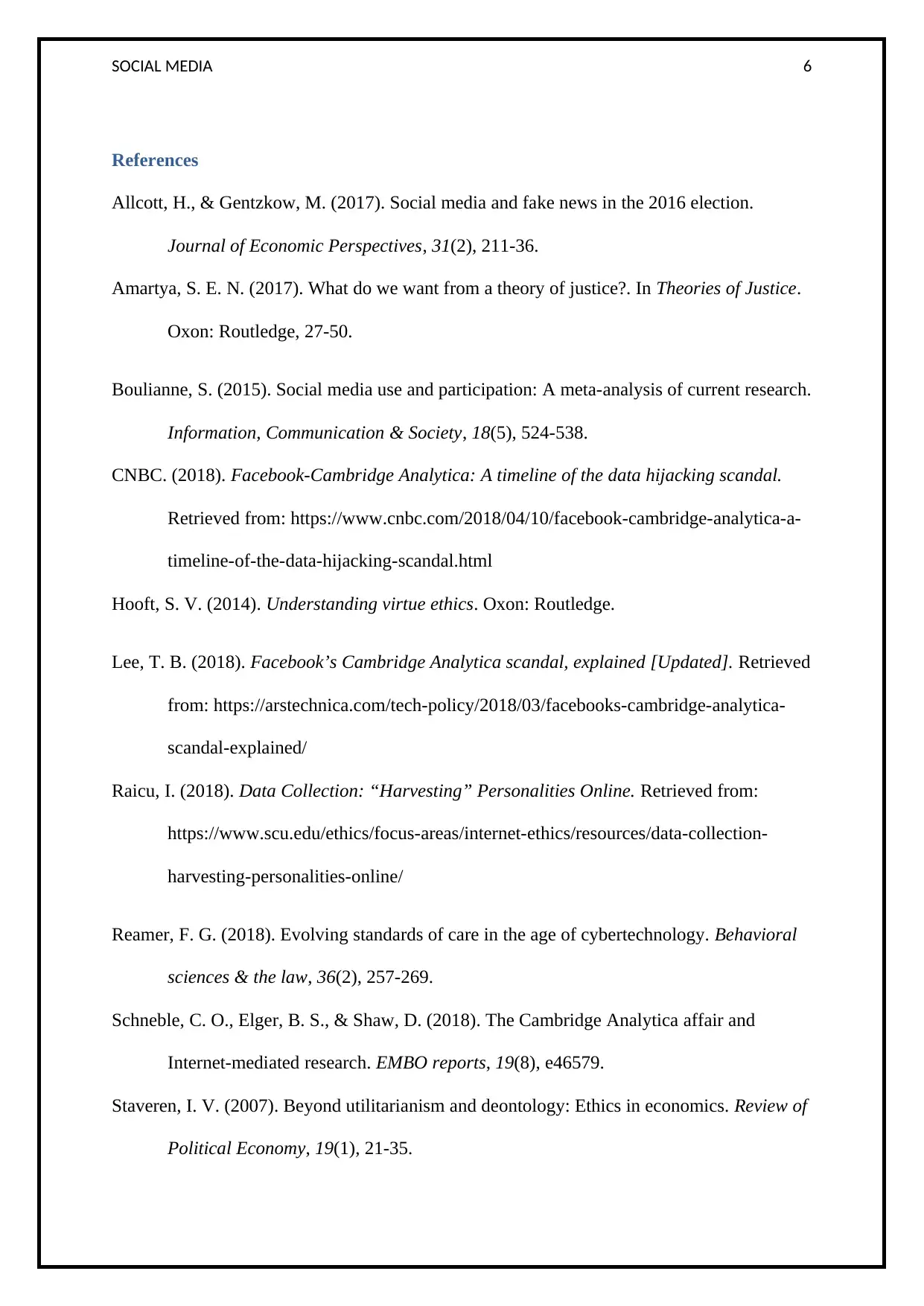
SOCIAL MEDIA 6
References
Allcott, H., & Gentzkow, M. (2017). Social media and fake news in the 2016 election.
Journal of Economic Perspectives, 31(2), 211-36.
Amartya, S. E. N. (2017). What do we want from a theory of justice?. In Theories of Justice.
Oxon: Routledge, 27-50.
Boulianne, S. (2015). Social media use and participation: A meta-analysis of current research.
Information, Communication & Society, 18(5), 524-538.
CNBC. (2018). Facebook-Cambridge Analytica: A timeline of the data hijacking scandal.
Retrieved from: https://www.cnbc.com/2018/04/10/facebook-cambridge-analytica-a-
timeline-of-the-data-hijacking-scandal.html
Hooft, S. V. (2014). Understanding virtue ethics. Oxon: Routledge.
Lee, T. B. (2018). Facebook’s Cambridge Analytica scandal, explained [Updated]. Retrieved
from: https://arstechnica.com/tech-policy/2018/03/facebooks-cambridge-analytica-
scandal-explained/
Raicu, I. (2018). Data Collection: “Harvesting” Personalities Online. Retrieved from:
https://www.scu.edu/ethics/focus-areas/internet-ethics/resources/data-collection-
harvesting-personalities-online/
Reamer, F. G. (2018). Evolving standards of care in the age of cybertechnology. Behavioral
sciences & the law, 36(2), 257-269.
Schneble, C. O., Elger, B. S., & Shaw, D. (2018). The Cambridge Analytica affair and
Internet‐mediated research. EMBO reports, 19(8), e46579.
Staveren, I. V. (2007). Beyond utilitarianism and deontology: Ethics in economics. Review of
Political Economy, 19(1), 21-35.
References
Allcott, H., & Gentzkow, M. (2017). Social media and fake news in the 2016 election.
Journal of Economic Perspectives, 31(2), 211-36.
Amartya, S. E. N. (2017). What do we want from a theory of justice?. In Theories of Justice.
Oxon: Routledge, 27-50.
Boulianne, S. (2015). Social media use and participation: A meta-analysis of current research.
Information, Communication & Society, 18(5), 524-538.
CNBC. (2018). Facebook-Cambridge Analytica: A timeline of the data hijacking scandal.
Retrieved from: https://www.cnbc.com/2018/04/10/facebook-cambridge-analytica-a-
timeline-of-the-data-hijacking-scandal.html
Hooft, S. V. (2014). Understanding virtue ethics. Oxon: Routledge.
Lee, T. B. (2018). Facebook’s Cambridge Analytica scandal, explained [Updated]. Retrieved
from: https://arstechnica.com/tech-policy/2018/03/facebooks-cambridge-analytica-
scandal-explained/
Raicu, I. (2018). Data Collection: “Harvesting” Personalities Online. Retrieved from:
https://www.scu.edu/ethics/focus-areas/internet-ethics/resources/data-collection-
harvesting-personalities-online/
Reamer, F. G. (2018). Evolving standards of care in the age of cybertechnology. Behavioral
sciences & the law, 36(2), 257-269.
Schneble, C. O., Elger, B. S., & Shaw, D. (2018). The Cambridge Analytica affair and
Internet‐mediated research. EMBO reports, 19(8), e46579.
Staveren, I. V. (2007). Beyond utilitarianism and deontology: Ethics in economics. Review of
Political Economy, 19(1), 21-35.
Paraphrase This Document
Need a fresh take? Get an instant paraphrase of this document with our AI Paraphraser
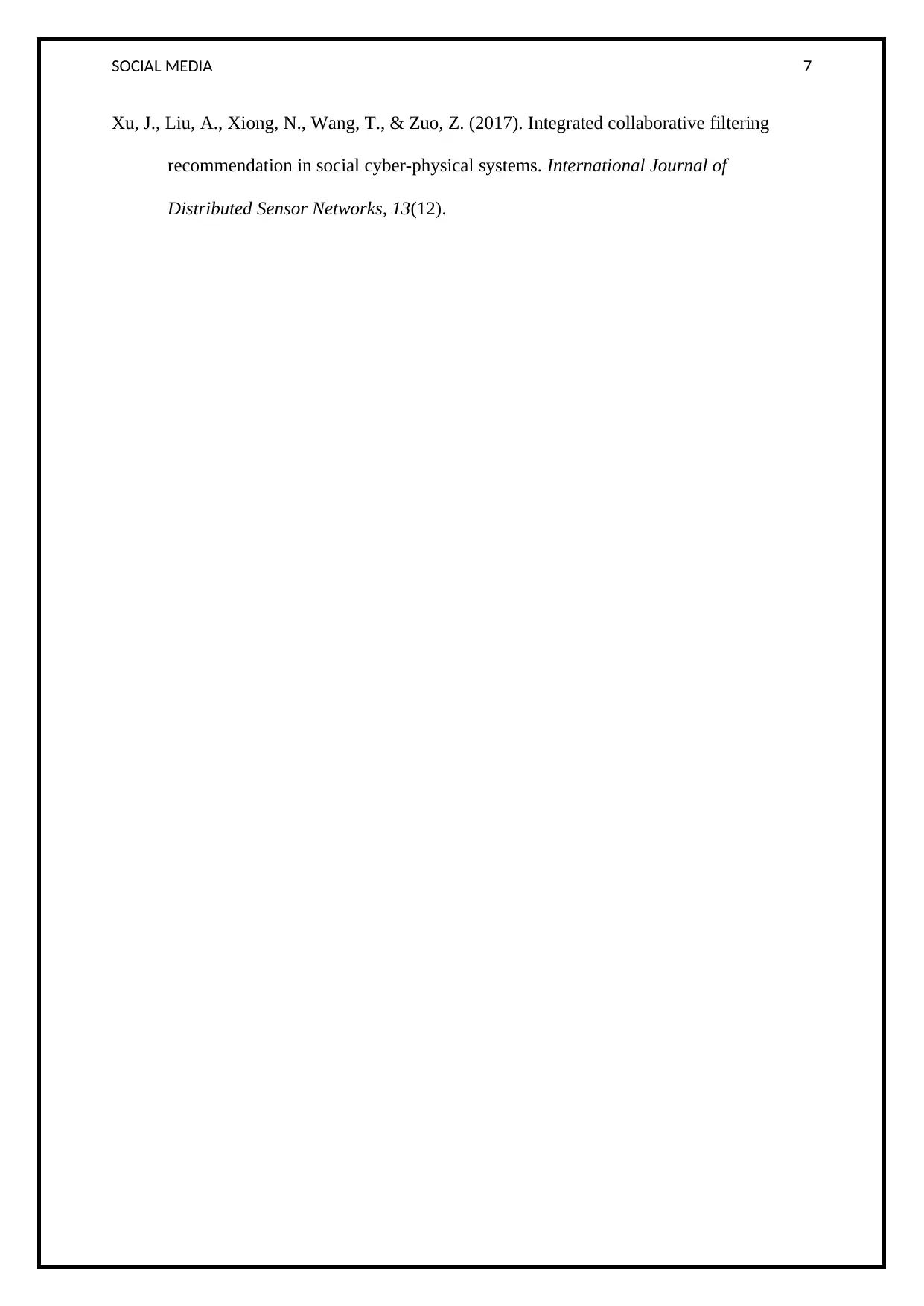
SOCIAL MEDIA 7
Xu, J., Liu, A., Xiong, N., Wang, T., & Zuo, Z. (2017). Integrated collaborative filtering
recommendation in social cyber-physical systems. International Journal of
Distributed Sensor Networks, 13(12).
Xu, J., Liu, A., Xiong, N., Wang, T., & Zuo, Z. (2017). Integrated collaborative filtering
recommendation in social cyber-physical systems. International Journal of
Distributed Sensor Networks, 13(12).
1 out of 8
Related Documents
Your All-in-One AI-Powered Toolkit for Academic Success.
+13062052269
info@desklib.com
Available 24*7 on WhatsApp / Email
![[object Object]](/_next/static/media/star-bottom.7253800d.svg)
Unlock your academic potential
Copyright © 2020–2026 A2Z Services. All Rights Reserved. Developed and managed by ZUCOL.





